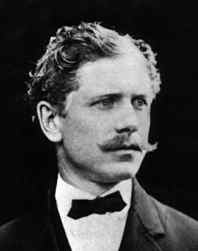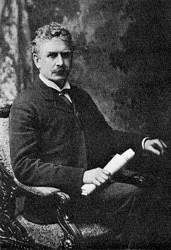Атеизм
Учебка
Портретная галерея
Персоналии
Знаменитые атеисты
FAQ по атеизму
Архив сайта
Обновления
О Сайте
Ссылки
Гостевая книга
Американский журналист, сатирик, писатель; атеист.
|
Ambrose Bierce (1842-1914?) was
one of the foremost writers of the 19th - century. His stories of war, of
despair, of horror, of the mysterious, were epoch defining and continue to
influence literature. For his wit he was called the Mark Twain of the North. He
was the chum of Jack London and the mentor of H. L.
Mencken. The very first tract he wrote was a defense of atheism and
freethought, a theme he would never leave.
His meager childhood was brightened, and he was ultimately empowered by his
father, who gave him the love of history and literature. At 19 he enlisted, and
was seared by his experiences in the Civil War, where he served with
distinction. Afterwards, he wrote over a thousand columns for various
newspapers. William Randolph Hearst secured him as soon as he acquired the
San Francisco Examiner. There he stayed for over 20 years. All the while
Bierce wrote war stories, horror stories, novels, and short stories of the
mysterious and the macabre. Apparently he wrote because he had to, to get it
out, to deal with it, to survive the impact of the Civil War on his life - he
had to tell of the headless corpses, the boar-eaten bodies of the fallen men,
the blood, the screams. Bierce wrote of the insanity to keep depression from
taking him. He challenged his country to become civilized enough to admit its
hypocrisies, pretensions and its crassness.
He always wanted one word to do the work of four. He garnished his newspaper
columns with "definitions" of various words. In 1906 he gathered them together
in the Devil's
Dictionary which continues to be re-published as one of the greatest in
19th century satire. A sampling -
Birth, n. The first and direst of all disas-ters. Ambrose Bierce chaffed at this world as long as he could, but after losing
his wife to divorce and two sons to death, the asthmatic, superstitious, bilious
atheist felt compelled to write his friends of his premonition of approaching
death. Soon he would vanish with few clues. Most of his biographers believe, at
age 71, he went to assist Pancho Villa and his rebel army in the struggle to
unseat the corrupt church-state government of revolutionary Mexico. Others claim
his "life's fitful fever" ended in a Grand Canyon suicide. His thoughts,
his humor, his wit, and his social criticism remain. Some heathens whose Idol was greatly weatherworn threw it into a river,
and erecting a new one, engaged in public worship at its base. Religions are
conclusions for which the facts of nature supply no major
premises. Nothing is more
logical than persecution. Religious tolerance is a kind of
infidelity. Theology is a thing
of unreason altogether, an edifice of assumption and dreams, a
superstructure without a substructure. Camels and Christians
receive their burdens kneeling. Altar, n. The place whereon the priest
formerly raveled out the small intestine of the sacrificial victim for
purposes of divination and cooked its flesh for the gods. The word is now
seldom used, except with reference to the sacrifice of their liberty and
peace by a male and a female fool. Bigot, n. One who is obstinately and
zealously attached to an opinion that you do not entertain. Brahma, n. He who created the Hindoos,
who are preserved by Vishnu and destroyed by Siva -- a rather nearer division of labor than is found among
the deities of some other nations. The Abracadabranese, for example, are
created by Sin, maintained by Theft, and destroyed by Folly. The priests
of Brahma, like those of the Abracadabranese, are holy and learned men who
are never naughty. Caaba, n. A large stone presented by
the archangel Gabriel to the patriarch Abraham, and preserved at Mecca.
The patriarch had perhaps asked the archangel for bread. Christian, n. One who believes that the
New Testament is a divinely inspired book admirably suited to the
spiritual needs of his neighbor. One who follows the teachings of Christ
in so far as they are not inconsistent with a life of sin. Clergyman, n. A man who undertakes the
management of our spiritual affairs as a method of bettering his temporal
ones. Convent, n. A place of retirement for
women who wish for leisure to meditate upon the sin of idleness. Decalogue, n.
A series of commandments, ten in number -- just
enough to permit an intelligent selection for observance, but not enough
to embarrass the choice. Following is the revised edition of the
Decalogue, calculated for this meridian. Embalm, v. To cheat vegetation by
locking up the gases upon which it feeds. By embalming their dead and
thereby deranging the natural balance between animal and vegetable life,
the Egyptians made their once fertile and populous country barren and
incapable of supporting more than a meagre crew. The modern metallic
burial casket is a step in the same direction, and many a dead man who
ought now to be ornamenting his neighbor's lawn as a tree, or enriching
his table as a bunch of radishes, is doomed to a long inutility. We shall
get him after awhile if we are spared, but in the meantime the violet and
the rose are languishing for a nibble at his glutaeus maximus. Evangelist, n. A bearer of good
tidings, particularly (in a religious sense) such as assure us of our own
salvation and the damnation of our neighbours. Excommunication, n. ... Damning, with
bell, book and candle / Some sinner whose opinions are a scandal. / A rite
permitting Satan to enslave him / Forever, and forbidding Christ to save
him. Houri, n. A comely female inhabiting
the Mohammedan Paradise to make things cheery for the good Mussulman,
whose belief in her existence marks a noble discontent with his earthly
spouse, whom he denies a soul. Immortality, n. Impale, v.t. In popular usage to pierce
with any weapon which remains fixed in the wound. This, however, is
inaccurate; to impale is, properly, to put to death by thrusting an
upright sharp stake into the body, the victim being left in a sitting
position. This was a common mode of punishment among many of the nations
of antiquity, and is still in high favor in China and other parts of Asia.
Down to the beginning of the fifteenth century it was widely employed in
"churching" heretics and schismatics. Wolecraft calls it the "stoole of
repentynge," and among the common people it was jocularly known as "riding
the one legged horse." Ludwig Salzmann informs us that in Thibet
impalement is considered the most appropriate punishment for crimes
against religion; and although in China it is sometimes awarded for
secular offences, it is most frequently adjudged in cases of sacrilege. To
the person in actual experience of impalement it must be a matter of minor
importance by what kind of civil or religious dissent he was made
acquainted with its discomforts; but doubtless he would feel a certain
satisfaction if able to contemplate himself in the character of a
weather-cock on the spire of the True Church. Impiety, n. Your irreverence toward my
deity. Infidel, n. In New York, one who does
not believe in the Christian religion; in Constantinople, one who does.
(See Giaour.) A kind of scoundrel
imperfectly reverent of, and niggardly contributory to, divines,
ecclesiastics, popes, parsons, canons, monks, mollahs, voodoos,
presbyters, hierophants, prelates, obeah-men, abbes, nuns, missionaries,
exhorters, deacons, friars, hadjis, high-priests, muezzins, brahmins,
medicine-men, confessors, eminences, elders, primates, prebendaries,
pilgrims, prophets, imaums, beneficiaries, clerks, vicars-choral,
archbishops, bishops, abbots, priors, preachers, padres, abbotesses,
caloyers, palmers, curates, patriarchs, bonezs, santons, beadsmen,
canonesses, residentiaries, diocesans, deans, subdeans, rural deans,
abdals, charm-sellers, archdeacons, hierarchs, class-leaders, incumbents,
capitulars, sheiks, talapoins, postulants, scribes, gooroos, precentors,
beadles, fakeers, sextons, reverences, revivalists, cenobites, perpetual
curates, chaplains, mudjoes, readers, novices, vicars, pastors, rabbis,
ulemas, lamas, sacristans, vergers, dervises, lectors, church wardens,
cardinals, prioresses, suffragans, acolytes, rectors, cures, sophis,
mutifs and pumpums. Koran, n. A book which the Mohammedans
foolishly believe to have been written by divine inspiration, but which
Christians know to be a wicked imposture, contradictory to the Holy
Scriptures. Mammon (riches), n. The god of the
world's leading religion. Piety, n. Reverence for the Supreme
Being, based upon His supposed resemblance to man. The pig is taught by
sermons and epistles / To think the God of Swine has snout and
bristles. Reprobation, n. In theology, the state
of a luckless mortal prenatally damned. The doctrine of reprobation was
taught by Calvin, whose joy in it was somewhat marred by the sad sincerity
of his conviction that although some are foredoomed to perdition, others
are predestined to salvation. Reverence, n. The spiritual attitude of
a man to a god and a dog to a man. Theosophy, n. An ancient faith having
all the certitude of religion and all the mystery of science. The modern
Theosophist holds, with the Buddhists, that we live an incalculable number
of times on this earth, in as many several bodies, because one life is not
long enough for our complete spiritual development; that is, a single
lifetime does not suffice for us to become as wise and good as we choose
to wish to become. To be absolutely wise and good -- that is perfection; and the
Theosophist is so
keen-sighted as to have observed that everything desirous of improvement
eventually attains perfection. Less competent observers are disposed to
except cats, which seem neither wiser nor better than they were last year.
The greatest and fattest of recent Theosophists was the late Madame
Blavatsky, who had no cat. Trinity, n. In the multiplex theism of
certain Christian churches, three entirely distinct deities consistent
with only one. Subordinate deities of the polytheistic faith, such as
devils and angels, are not dowered with the power of combination, and must
urge individually their clames to adoration and propitiation. The Trinity
is one of the most sublime mysteries of our holy religion. In rejecting it
because it is incomprehensible, Unitarians betray their inadequate sense
of theological fundamentals. In religion we believe only what we do not
understand, except in the instance of an intelligible doctrine that
contradicts an incomprehensible one. In that case we believe the former as
a part of the latter. |


